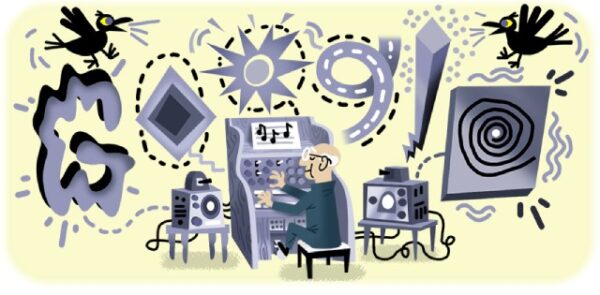
Fascinating and Entertaining Trivia about Oskar Sala: A German physicist, composer, and pioneer of electronic music
On July 18, 2022, Google pays tribute to Oskar Sala, a renowned 20th-century German physicist, composer, and trailblazer of electronic music, as he celebrates his 112th birthday. To honor this occasion, here are some captivating, intriguing, and enjoyable facts about Oskar Sala.
23 Interesting and fun facts about Oskar Sala
- Oskar Sala was born in Greiz, Germany, in 1910 and grew up in a musically inclined family, with a mother who was a singer and a father who had musical talent as an ophthalmologist. He began composing and creating music for instruments like the violin and piano at the age of 14.
- Known as the inventor of the trautonium, Oskar Sala created and mastered this groundbreaking electronic musical instrument in 1929, which is recognized as the world’s first of its kind.
- Oskar Sala gained fame for his role in the invention of the trautonium, an early electronic instrument that emerged alongside other notable inventions like the French Ondes Martenot and the Russian theremin.
- During his teenage years, Oskar Sala studied piano and organ, showcasing his talent through performances in classical piano concerts.
- In 1929, Oskar Sala moved to Berlin to pursue studies in piano and composition under the guidance of Paul Hindemith, a renowned composer and violist, at the Berlin conservatory.
- While studying in Berlin, Oskar Sala became intrigued by the experiments conducted by Dr. Friedrich Trautwein at the conservatory’s laboratory, where he learned to play the Trautwein’s pioneering electronic instrument, the Trautonium.
- On June 20, 1930, Oskar Sala, along with Paul Hindemith, presented a public performance titled “Neue Musik Berlin 1930” at the Berliner Musikhochschule Hall to introduce the Trautonium to the world.
- Oskar Sala took the Trautonium on tour in Germany and performed as a soloist in Hindemith’s Concert for Trautonium with String Quartet in 1931. He also showcased his skills in the premiere of Harald Genzmer’s “Concert for Trautonium AND Orchestra.”
- While Oskar Sala initially studied under Friedrich Trautwein, the inventor of the Trautonium, he later pursued music studies with Paul Hindemith in 1930 at the Berlin Conservatory, where he played his compositions on the Trautonium.
- Between 1932 and 1935, Sala studied physics at the University of Berlin and actively contributed to the development of the “Volkstrautonium,” a version of the Trautonium that Telefunken sought to popularize.
- In 1935, Oskar Sala constructed a “Radio-Trautonium,” followed by a compact model called the “Konzerttrautonium” in 1938.
- From the early stages with Trautwein to his collaboration with the Berlin Philharmony under Carl Schuricht in 1940, Oskar Sala composed and performed pieces specifically designed for the Trautonium.
- In his 40s, Oskar Sala turned his focus to film scoring and contributed to several iconic films, including Alfred Hitchcock’s The Birds, where he successfully convinced Hitchcock to utilize his Trautonium-generated sound effects for the eerie bird scenes.
- Oskar Sala’s significant contribution to electronic music includes the invention of the mixtur-trautonium, an early electronic musical instrument that served as a precursor to the electronic synthesizer. As a virtuoso of the instrument, Sala was the sole performer capable of playing it skillfully.
- In 1948, Oskar Sala further advanced the Trautonium and developed the Mixtur-Trautonium, which allowed for the execution of sounds previously known only in theory since the Middle Ages, but rarely achievable in practice.
- The introduction of Sala’s Mixtur-Trautonium to the public in 1952 marked a groundbreaking moment in music history, and international licenses for its circuits were soon obtained. Its unique architecture remains unmatched, making it impossible to replicate the instrument or interpret its compositions.
- In the same year, composer Harald Genzmer created the score for the first Concert for Mixtur-Trautonium and Grand Orchestra.
- During the 1950s, Oskar Sala continued his innovation by developing the Quartett-Trautonium.
- Throughout the 1940s and 1950s, Sala worked extensively on film scores, establishing his own studio at Mars film GmbH in Berlin in 1958. Notable contributions include electronic soundtracks for films like Veit Harlan’s Different from You and Me (1957), Rolf Thiele’s Rosemary (1959), and Fritz Lang’s Das Indische Grabmal (1959).
- Oskar Sala gained recognition for creating the non-musical soundtrack for Alfred Hitchcock’s film The Birds.
- Although he received numerous awards for his film scores, Oskar Sala never won an Oscar. He also made significant contributions to German commercials, including the well-known HB’s little man.
- Oskar Sala held the honorary title of Senator of Berlin.
- On July 18, 2022, Google commemorated Oskar Sala’s 112th birthday by featuring a Doodle on its homepage, celebrating his remarkable achievements and contributions.
Next Read: Fascinating Insights about Kiyoshi Kuromiya: A Japanese American Civil Rights Activist



